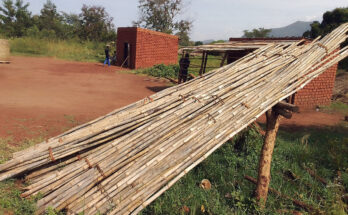PHOTO: Section of Gulu Regional Referral Hospital medical ward-Photo by Simon Wokaorch
GULU
Lying on her sickbed number 31 at Gulu Regional Referral Hospital is Ms Rose Akullu, a 35-year-old single mother of four who is battling an acute liver illness, Hepatitis B.
Ms Akullu, a resident of Paidwe, Bobi Sub-county in Omoro District, who was previously admitted to a local clinic in Omoro with an abdominal complication, arrived at the hospital on October 4 upon her referral.
Once examined by medical doctors, she was recommended to undergo an urgent complete blood test including a liver scan and liver function tests to help in diagnosing her.
While at the hospital laboratory, Ms Akullu told Daily Monitor that she was advised to go and conduct the tests from a private health facility, Pole Clinical Laboratory, in the hospital’s neighbourhood because the equipment at the hospital was damaged.
“They asked me to go to Pole Clinical Laboratory, but when I reached there, the charges were beyond Shs100,000 and it took me another week to liaise with my family at home to sell some food stock to raise the money,” she says.
Test results dated October 7 indicated that she was a high-risk patient with hepatocellular carcinoma, the most common type of primary liver cancer in adults resulting from Hepatitis B.
Ms Akullu says she was subsequently asked to do an ultrasound scan, and this time referred to a different facility named Piwan Medical Centre in Gulu City.
Abdominopelvic ultrasound report from the facility, which this newspaper has seen indicated multiple tumours with a ‘grossly’ enlarged liver and spleen.

“At Pole Clinical Laboratories, I spent Shs60,000 while at Piwan Medical Centre, I also spent a similar amount on tests alone, let alone costs of essential medicines that I have been buying from the pharmacy while on the sickbed here,” she says.
Just like Ms Akulu, Mr Denis Olara, a resident of Holy Rosary Cell in Laroo-Pece Division in Gulu City, could not shoulder medical costs for multiple tests on his organs when the hospital asked him to carry them out from a private facility.
Two weeks later, he raised money and conducted the tests at Flama Medical Centre, a private health facility in Gulu City. He was diagnosed with acute Pancreatitis on October 4.
Although he has since been enrolled for care at the medicine ward, Mr Olara faces a similar challenge to that of Akullu by footing the high costs of buying drugs from private facilities.
While Ms Akullu says she has spent more than Shs350,000 on tests and purchase of drugs and has remained bedridden for three weeks, Mr Olara has been permitted (temporarily discharged) to go home and look for money to help him carry out more tests.
“Right now, I am looking for money to do another test. I requested for discharge to go home and look for money,” Mr Olara says.
Several Hepatitis B patients say they are asked to buy medicines from pharmacies and other private health units. The facility’s registry indicates that 595 Hepatitis B patients are currently enrolled for care and treatment.
Idle Equipment
Whereas patients are referred to do tests and examinations from private facilities, our investigation established that the equipment used to conduct blood analysis, liver function and liver scan tests are available in the hospital.
Among the machines available, but idle are the HBsAg machine used for conducting surface antigen screening tests for Hepatitis B, Semi-Automated Chemistry for liver function tests and Haematology Analyser used for blood complete tests.
Cost of liver diagnosis
A survey of several health facilities conducting liver examinations indicated that a complete blood count costs about Shs20,000, liver scan costs between Shs25,000 and Shs30,000 while the liver function test costs between Shs45,000 and Shs60,000.
Once patients are done with the tests, they return with the results and present them to the medical staff who then prescribes the drugs, some of which the patients are asked to purchase from private facilities.
Dr Joshua Wacha, a doctor attached to a special clinic (handling diabetes, hepatitis, blood pressure, etc.) at the hospital admits that the machines are available and working.
He, however, notes that they (machines) are unable to handle the overwhelming number of patients, prompting referrals.
“At the hospital here, the tools are there, but they cannot meet the demand, sometimes the demand is higher than what the hospital has, some will access it while others will not,” Dr Wacha says.
“Because liver monitoring tools for doing complete tests, complete blood count, liver scan and all these are costly, it becomes a challenge to monitor the progress of Hepatitis B if it hits someone at the moment and they do not have money,” he adds. Dr Wacha also says for the issue of medication, the patients are always getting the drugs.
However, Mr James Otim Onegiu, the acting principal hospital administrator, differs from Dr Wacha. He dispels claims of broken-down or overused machines for testing patients for Hepatitis B. He states that there is a possibility where “either the intern doctors are striking deals with private health facilities or our cadres are intending to do what we need to investigate.”
“As regards liver function tests, renal functions, and complete blood counts, we have all those equipment available in our laboratories at no fee unless one goes to the private wing of the hospital then you are asked to pay some money,” he said.
“Sometime back, we never had the reagents supplied by National Medical Stores and that is when patients were being asked to go and do it [testing] from town, but since we have the supplies and all reagents available, all the tests are available at the hospital.”
Disease burden
At Pole Clinical Laboratory, of the 4,752 tests conducted between May and August, 77 involved liver function tests on cases related to Hepatitis B infections.
Dr Michael Okwonga, a staff at the lab, says many of the patients were referred from Gulu Regional Referral Hospital, Lacor Hospital and other health facilities across the sub-region.
At Flama Uganda, a private medical facility in Gulu City, records indicate that of the 144 tests conducted, 27 turned positive for Hepatitis B. Dr Robert Alex Adiga, a laboratory technician working in the facility, says many of the patients were referred from Gulu Hospital.
Data from Gulu District Health Department shows that 832 patients were diagnosed with Hepatitis B between January 2020 and February 2021. The data was collected from 60 different health facilities in the district. Twenty-Nine of the patients succumbed to the disease, seven succumbed to liver cirrhosis and three died of hepatocellular carcinoma.
There were 172 patients admitted to Gulu Regional Referral Hospital, and 55 were at St Mary’s Hospital Lacor. The prevalence rate of the disease in the district stands at 10%.
This story was produced with grant support from the Northern Uganda Media Club (NUMEC) with the aim of promoting quality journalism on public interest matters. The story was published in the Daily Monitor on November 1st, 2021




